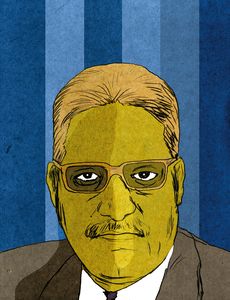The last published words that Shujaat Bukhari, editor of Rising Kashmir, wrote a few days before he was gunned down outside his Srinagar office, were: “Fact- checking, contextualising, and accuracy are the tools that are most important to follow. Losing a line between news reporting and opinion reporting is anathema to journalism.” These are words that need to be written up in gold, and hung in every newspaper office and TV studio.
Shujaat himself was faithful to his dictum. Unfortunately, too many of his peers are far too ready to sacrifice journalistic ethics of that order to get out a quickie before “breaking news” moves on to the next sensation. Sometimes, this can lead to the most tragic consequences for, as Barkha Dutt wrote, after the assassination, in The Washington Post, “Two of India’s leading channels are fronted by men and women guilty of prime-time hate mongering…. Their verbal violence can actually be a cue for the mob.” These anchors may not have actually pulled the trigger, but certainly the kind of vicious polarisation they promote every evening matches the preaching from the pulpit of the extremists.
I only got to know Shujaat in what turned out to be the last year of his life. His generosity with his time and contacts were overwhelming. My last conversation with him was to ask if he could help with an elderly, if distant, relative who had to be hospitalised in Srinagar after suffering a bad fall in Gulmarg that broke his hip bone. Although Shujaat was in Lisbon at the time, he immediately arranged for the surgeons at the Srinagar government hospital and requested his wife to visit the family in the hospital.
That gesture symbolised the man. He could be reached at any time, anywhere; he was always ready to help; he honoured human beings of all persuasions; humane, gentle and compassionate, as only one who sees suffering on all sides can be; convinced and convincing that “violence must stop to create space for dialogue”. He listened to all sides and only then spoke. But, when he spoke, he was fearless. “Fear, to an extent is born of the story we tell ourselves,” he told Iftikhar Gilani of the DNA. “In Kashmir, we have done journalism with pride and we will continue to highlight what happens on the ground,” he said.
That, ultimately, is what led to his brutal, senseless murder. For a while he was endlessly trolled and threatened on social media for his moderation, by Kashmiri terrorists and their Pakistani patrons. He called it “intellectual terrorism”. He was equally blunt in telling New Delhi, as he did at his last public meeting in the capital that I attended: “Things are much worse than any of you care to admit. An entire generation is growing up hating India.”
His extremist Kashmiri opponents described Bukhari, and those who thought like him, as “pawns and touts of Indian agencies” and “scribes who betray the very blood that runs in their veins”, and Syed Salahuddin of the Hizbul Mujahideen damned his plea for non-violence as “backstabbing the tehreeq [movement]”. But, Shujaat patiently sought to explain to Modi and his cohort that the massive state violence unleashed in the valley could not be countered by the slogan “development, development, development”, as Modi had sought to do on his fleeting one-day visit to the valley on May 25, for it ignored the “political context of the resistance on the ground”. The future, too, he added, “does not hold any promise unless the political nature is accepted”. And, this required an end to violence by all sides.
For such wisdom, Shujaat Bukhari, like Mahatma Gandhi, paid with his life. Hey Ram!
Aiyar is a former Union minister and social commentator.


